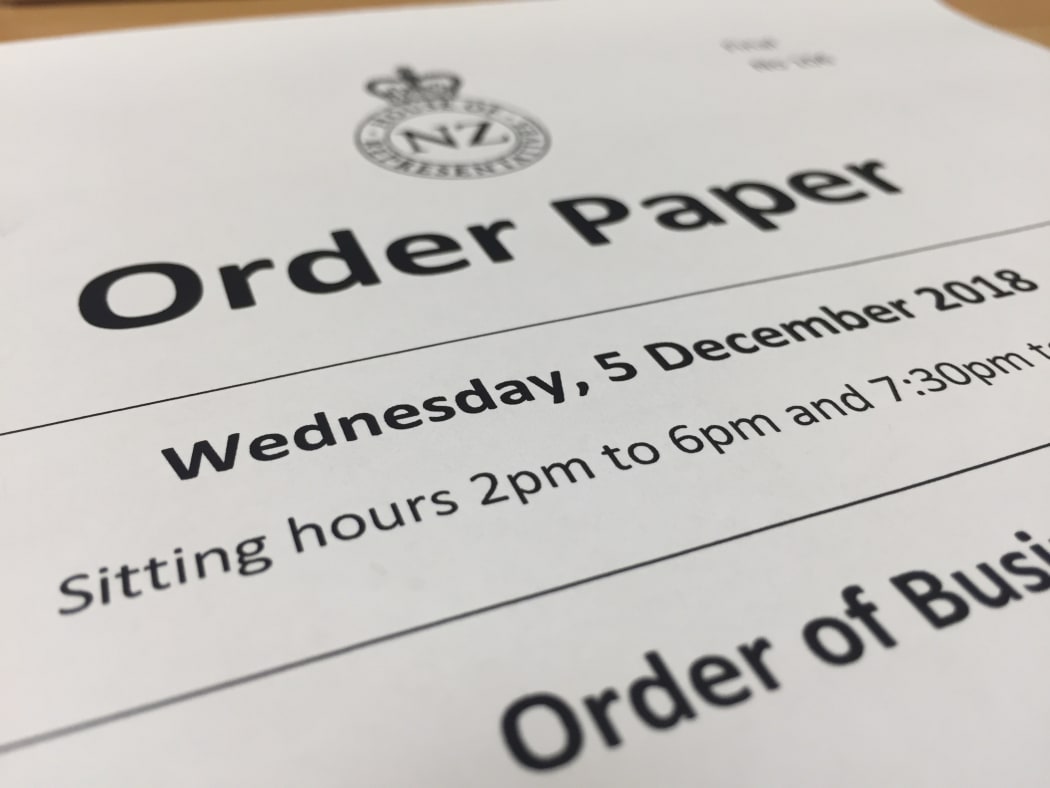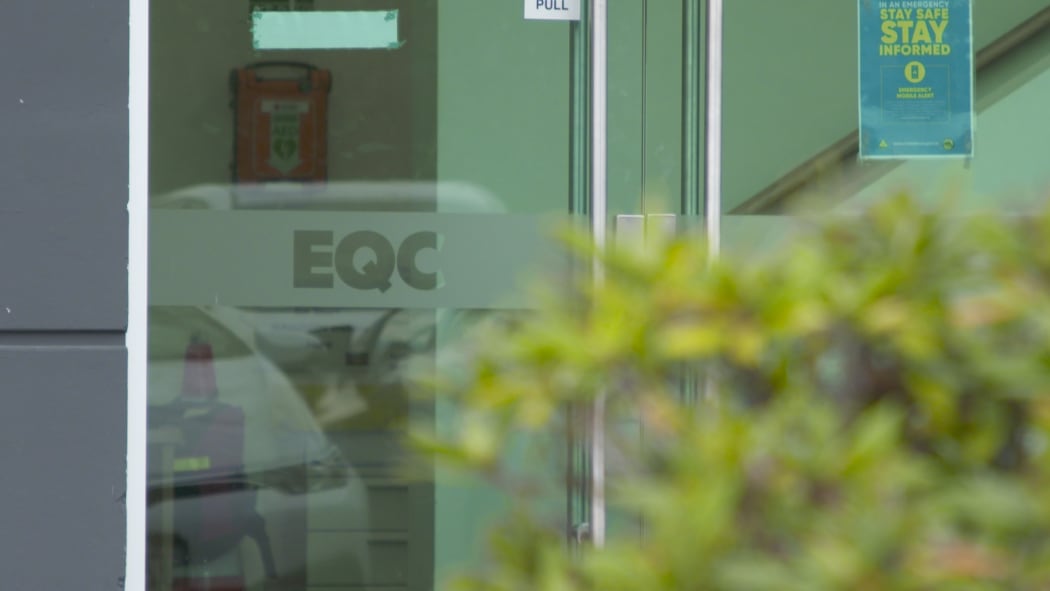Wednesdays are different at Parliament. This Wednesday doubly so. Well not quite doubly, Wednesday will actually last 34 hours ending at 1pm on Thursday. That’s a lot of time for debating but there’s a big list of things to get done.
And of course, there’s also the daily inquisition during Oral Questions, and it being Wednesday, an hour of the General Debate, Parliament’s version of slam oratory (with the emphasis on slam).
The Order Paper lists what MPs will debate but it can change. Here is an estimate of what they’ll try to work through.
Question Time - 2pm
What:
-
Twelve Questions are posed to ministers with inquisitorial follow-ups (supplementary questions). Roughly two thirds of them are asked by the Opposition. It’s an hour of high drama, semantic-linguistic puzzles and debates over the rules. And shouting.

The Order Paper cover for Dec 5th Photo: VNP / Phil Smith
Taupatupatu Whānui - The General Debate - 3pm(ish)
What:
-
Twelve speeches of up to five minutes in length. Bigger parties get more speeches.
Why:
-
The general debate is so MPs can bring up issues that specific debates on legislation don’t cover, making it a wide-ranging debate. Sometimes each party coordinates their talking points but they don’t have to. There’s fewer rules generally and it can be both raucous and entertaining.
Employment Law Redux -Third Reading
What:
-
The Third and final reading of the Employment Relations Amendment Bill. Iain Lees-Galloway as the Minister for Workplace Relations is in charge of this bill.
-
Very broadly the bill undoes a few changes that the previous, National-led government made to employment law. Particularly contentious during the select committee review were issues around union access to workplaces and 90 day trials for new staff.
-
There are also rules around union access to new staff, information about wage rates in collective agreements, rules around bargaining, strikes, and rest and meal breaks.
-
A third reading is the final debate on bill - MPs usually recap the process, the overall intentions, purposes and outcomes expected from a bill.
What the MPs said:
-
In the first reading debate on this bill the Minister in Charge, Iain Lees-Galloway said:
“An effective employment relations framework balances the need for employers to have flexibility in how they run their businesses while providing safeguards and rights to employees. This bill rolls back a number of the previous Government's amendments that weakened employees' rights at work and tipped the balance too far away from the principles of basic fairness.”
-
In their dissenting opinion in the select committee report on this bill the National Party MPs said:
“The cumulative impact of changes to workplace relations contained in this bill will place a handbrake on economic growth, further undermine business confidence, reduce job creation opportunities for vulnerable employees, create a return to 1970s style aggressive adversarial trade union activity, and will ultimately be bad for both employees and employers.”

Photo: Supplied
Medicinal Cannabis - Committee Stage (continued)
What:
-
The Misuse of Drugs (Medicinal Cannabis) Amendment Bill. The Minister of Health, David Clark is in charge of this bill.
-
This Bill amends the Misuse of Drugs Act 1975 to introduce an exception and a statutory defence for terminally ill people to possess and use illicit cannabis or possess a cannabis ‘utensil’. It doesn’t excuse their suppliers.
-
In this stage the Government has said it will extend that protection from ‘terminal’ patients to those in ‘palliation’.
-
It also creates a regulation-making power to set standards for cannabis products, and removes cannabidiol (CBD) from the list of controlled drugs.
Why:
-
This bill was the Government’s compromise response to a member’s bill in the name of Chloe Swarbrick that failed to pass its first reading early this Parliament.
-
The committee stage allows MPs to suggest amendments. There are already amendments promised from various corners.
What did the MPs say?
Coverage of the second reading.
-
At the Bill’s first reading, Labour’s Jenny Salesa said:
“We have examples of people who have spoken really strongly about the use of medicinal cannabis. Helen Kelly is one such example of a person who lived so bravely, so openly, with terminal illness, and she devoted the last part of her life to campaigning for her fellow New Zealanders to make their lives better. She felt for ordinary people for whom medicinal cannabis might make a real difference.”
-
National’s Dr Shane Reti said:
“That's going to need a lot of work to have my support to this and for our support, but we're certainly ready to have the dialogue in this whole discussion. We're not afraid of the dialogue and the discussion around medicinal cannabis, but it needs a lot of work.”

The Reserve Bank of New Zealand Photo: RNZ / Alexander Robertson
Rules for the Reserve Bank - Committee Stage
What:
-
The Committee Stage of the The Reserve Bank of New Zealand (Monetary Policy) Amendment Bill in the name of the Finance Minister Grant Robertson.
-
It amends the objectives that the Reserve Bank has to consider in setting monetary policy to include ‘consideration of maximum sustainable employment alongside price stability in monetary policy decision making’. It also formalises a ‘monetary policy committee’ to make decisions on monetary policy.
-
the Committee Stage is when MPs look at the details of a bill and suggest changes.
Why:
-
The Reserve Bank controls a few small levers for influencing the national economy and has rules about how it uses them. This bill adjusts those rules.
Who said what?
-
During the bill’s first reading, its sponsor Grant Robertson said:
“It is a very important part of our financial framework in New Zealand, but after 30 years with much change it is time to make sure that we create a resilient and sustainable and productive economy, and make sure that every part of our apparatus fits with that.”
-
National’s shadow finance spokesperson Amy Adams said:
“So my question again remains what is the problem we are trying to solve? How do we think this solution will solve it? Why have we differed from the very purpose clause that the Minister is introducing? And why have we not followed the international example which reflects that whole basket of economic conditions that the Reserve Bank has already taken into account?”

Photo: EQC, Christchurch, earthquake, Earthquake Commission
Speeding up earthquake related claims - Committee Stage
What:
-
The committee stage of the Earthquake Commission Amendment Bill
-
There is an Earthquake Commission Act 1993 which this bill will amend to simplify and speed up the handling of claims for natural disaster damage, particularly when dealing with a large-scale natural disaster.
Who:
-
Minister responsible for the Earthquake Commission Megan Woods.
-
At its first reading the Ms Woods said:
“The four amendments are to remove EQC cover for personal property or home contents cover; to increase the EQC building cap cover from $100,000 to $150,000 plus GST; to lengthen EQC's pay notification time limit; and to clarify EQC's authority to share and publish information, including to facilitate settlement of EQC and private insurer claims.”

Photo: RNZ / Dan Cook
Tūpāpaku inquiry outcomes - Committee Stage
What:
-
The Coroners (Access to Body of Dead Person) Amendment Bill gets a second reading on return from the Maori Affairs Select Committee.
-
The bill requires coroners to consider tikanga Māori and the practice of other cultures when deciding whether a family member can stay with a body.
Why:
-
Last year the Maori Affairs Select Committee held an inquiry into the intersection of Maori tikanga, and how quickly (or slowly) coroners allow families access to the bodies of the dead.
-
This bill enacts a recommendations made by that inquiry.
If things go quickly...
With four committee stages in the list of bills above it is very difficult to tell how far the House will manage to progress down the order paper before lunchtime Thursday. If the debates go quickly it is feasible that the House will progress as far as the second reading of the Crown Minerals Amendment Bill (No 2) [that's the less contentious minerals bill], and even the second reading of the Accident Compensation Amendment Bill.

